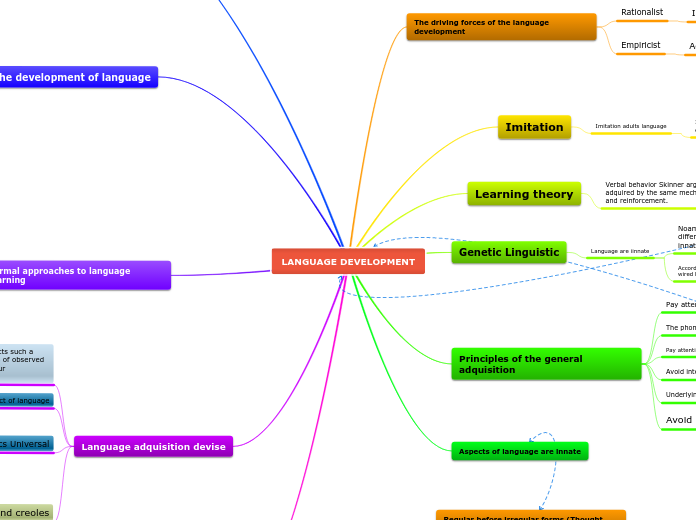Sintactic develpment
Regular before irregular forms (Thought interacts with frecuency frecuency)
SEMANTIC DEVELOPMENT
The relations between words and their referents
The word is a sign that signifies a referent:
Arbitrary , Symbolic , language-specific adapted by social convention
Babies can understand the "pragmatic intent" of adults' messagesbefore they can actually understand the meaning of the words, themselves
This message is understood at the emotional, social and contextual level (situational cues)
The emergence of early words
Meaning has to be a social construct---to be useful for communication
Mental images tend to be particularistic or idiosyncratic, e.g. "house" could look like a brick bungalow or a colonial
Meaning is a mental representation or "concept"
Some words are picturable/ mentally visualized, whereas others do not have a picturable referent
As words develop
Process of semantic dev: "strategies formed for learning word meanings and relating them to each other change as their internal representation of language constantly changes and becomes reorganized"
Learning the meanings of words
The relation between word The relation between words and their referents
Phonological development
Later phonological development
Output simplification
Refers to how children learn to organize sounds into meaning or language (phonology) during their stages of growth.
OUTPUT SIMPLIFICATIONS
Children simplify the words that they produce
Reduce consonants
Omitted unstressed syllables
Substitution of easier sounds for more difficult sounds
Producing shorter strings
Bubbling
Babbling can be seen as a precursor to language development
Is a stage in child development and a state in language acquisition during which an infant appears to be experimenting with uttering articulate sounds
Sounds from about 6 months and 10 months
Speech perceptions in infancy
These learning mechanisms include (but are not limited to) recognition memory, associative learning, and
statistical learning
The timing of syllables in a language
in infants’ language discrimination
Suprasegmental information, such as intonation and rhythm, transmits very well to fetuses. how prenatal experience with suprasegmental information affects infants’ early speech perception.
LANGUAGE DEVELOPMENT
Pragmatic factor affecting acquisition
Personal before non-personal
Gross before subtle distinctions
Simple and short before complex and long
Language adquisition devise
Pidgins and creoles
Creoles
Is a language that was originally a pidgin but has become nativized
Pidgins
Language is nobody's native language; may arise when two speakers of different languages with no common language
Linguistics Universal
Are features that can be found in most languages
Formal Universals
Substantive
Include syntax, semantics and phonology that are common in all languages
The parameter is a universal aspect of language
Mechanism which mentally constructs such a biderectional mapping, on the basis of observed samples of communicative behaviour (transmission and reception)
Formal approaches to language learning
Induction in learning rules
Formal learning, whether languages are involved or not, involves a set course
The development of language
Full sentences (2 years 6 months )
Telegraphic speech (2 years )
Two- word utterances ( 18 Months )
Single Word utterances ( 10 months - 18 months )
Babbling ( 6 Months -10 Months )
Vocal Play ( 16 Weeks - 6 Months )
Laughter ( 16 Weeks )
Cooing 6 (Weeks )
Vegetative sounds (0- 6 Weeks )
The role of child direct speech
Motherase: Special way of talking to children "Babytalk"
Children hear degenarative input "It is fulls of slips of the tongue
Aspects of language are innate
Principles of the general adquisition
Avoid exceptions
Underlying semantic relation
Avoid interruptions of rearrangement of units
Pay attention to the order of morphemes of words
The phonologica form of words can be modified
Pay attention to the ends of the words
Genetic Linguistic
Language are iinnate
According to Chomsky humans are born with innately hard wired language capabilities.
Noam Chomsky had come up with an entirely different and surprising explanation called innateness hypothesis.
Learning theory
Verbal behavior Skinner argued that language was adquired by the same mechanims of conditioning and reinforcement.
Imitation
Imitation adults language
Imitation plays in language development. The ability to copy and learn
The driving forces of the language development
Empiricist
Acquired
Through experience
Rationalist
Innate
Originated from Plato and Descartes

